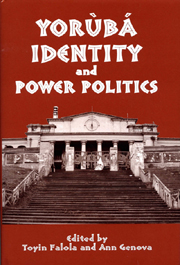Book contents
- Frontmatter
- Contents
- List of Illustrations
- Introduction
- Part I Writing Yorùbá
- Part II Chiefs and Tradition
- Part III Identity and Modern Politics
- 12 Approaching the Study of the Yorùbá Diaspora in Northern Nigeria
- 13 Yorùbá-Nigerians in Toronto: Transnational Practices and Experiences
- 14 Yorùbá Factor in Nigerian Politics
- 15 Politics, Ethnicity, and the Struggle for Autonomy and Democracy
- 16 Petroleum and Ethno-Politics
- 17 Chief M. K. O. Abiọla's Presidential Ambitions and Yorùbá Democratic Rights
- Notes on the Contributors
- Index
12 - Approaching the Study of the Yorùbá Diaspora in Northern Nigeria
from Part III - Identity and Modern Politics
Published online by Cambridge University Press: 12 September 2012
- Frontmatter
- Contents
- List of Illustrations
- Introduction
- Part I Writing Yorùbá
- Part II Chiefs and Tradition
- Part III Identity and Modern Politics
- 12 Approaching the Study of the Yorùbá Diaspora in Northern Nigeria
- 13 Yorùbá-Nigerians in Toronto: Transnational Practices and Experiences
- 14 Yorùbá Factor in Nigerian Politics
- 15 Politics, Ethnicity, and the Struggle for Autonomy and Democracy
- 16 Petroleum and Ethno-Politics
- 17 Chief M. K. O. Abiọla's Presidential Ambitions and Yorùbá Democratic Rights
- Notes on the Contributors
- Index
Summary
In 1956, the defunct Western Region government launched the Yorùbá Historical Research Scheme. The main aim was to produce an authentic and coherent history of the Yorùbá, covering all aspects of the people from the earliest times to the present. Despite the fact that a tremendous achievement has been recorded in this enterprise, an enormous lacuna still exists in the study of the Yorùbá diaspora in northern Nigeria. Although accounts of the Hausa impact on Yorùbá history, particularly for the precolonial and colonial periods, have been offered, only passing references have been made to acknowledge the Yorùbá factor in the history of the Hausa society during the same period. Within this context, this chapter examines the chronology of Yorùbá migration and formation of diaspora communities in northern Nigeria during the twentieth century. It raises the following questions: What were the migration patterns? What forms of identities did the diaspora communities produce? What were their linkages with the Yorùbá homeland? What were their contributions toward the development of towns in Yorùbáland? Of what implication was the Yorùbá diaspora to the socioeconomic development of northern Nigeria and Nigeria as a whole? The chapter focuses on the interplay of cultural, political, and economic forces in the formation of Yorùbá diaspora communities in northern Nigeria.
Conceptualizing the Yorùbá Diaspora
Àjò kò da bii ilé (Diaspora Is Not Like Home)
The Yorùbá diaspora in northern Nigeria is better understood within the historical context of the respective host communities and, indeed, the entire history of northern Nigeria as a whole.
- Type
- Chapter
- Information
- Yorùbá Identity and Power Politics , pp. 231 - 250Publisher: Boydell & BrewerPrint publication year: 2006



